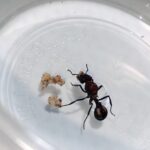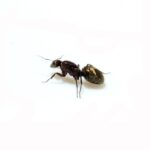Acromyrmex lundii
65,00€ – 160,00€Price range: 65,00€ through 160,00€
Discover the exotic ant Acromyrmex lundii! Renowned for its ingenious fungus agriculture, this species offers you the chance to witness how it creates a unique habitat and transforms your space into a captivating ecosystem! 🍃🐜
Important: The image is indicative, each fungus is different in shape and size.
Technical details of the ant Acromyrmex lundii
Scientific name: Acromyrmex lundii
Common name: Leaf-cutter ant
Taxonomic classification:
- Kingdom: Animalia
- Phylum: Arthropoda
- Class: Insecta
- Order: Hymenoptera
- Family: Formicidae
- Genus: Acromyrmex
- Species: A. lundii
Geographical distribution: It is mainly found in regions of South America, including parts of Argentina, Brazil, Paraguay, and Uruguay.
Physical description:
- Size: Workers measure around 5 to 8 millimeters long, while queens can reach up to 15 millimeters.
- Color: Workers are generally black, while queens may have lighter tones on their abdomen.
Biology:
- Colony type: Acromyrmex lundii forms highly organized and complex colonies.
- Feeding: They are known as leaf-cutter ants due to their habit of cutting pieces of leaves, which they then use to cultivate fungi in their nests, which constitute their main source of food.
- Life cycle: The colony is composed of workers, males, and one or more queens. Queens are responsible for laying eggs, which are then cared for and fed by the workers until they become new adult ants.
- Behavior: They are highly social and cooperative, working together to perform various tasks within the nest, such as leaf collection, caring for the brood, and defending the territory.
Ecological importance: A. lundii plays an important role in the ecosystems where it lives, contributing to the decomposition of organic matter and serving as a food source for other organisms.
| Options |
Queen + fungus ,Queen with 1 – 5 worker ants + fungus ,Queen with 6 – 10 worker ants + fungus ,Queen with 50 – 100 worker ants + fungus |
|---|
Related products
Myrmoteras benghammi colony
Sold out
Oecophylla smaragdina
Sold out
Camponotus herculeanus
Sold out
Formica sanguinea
Sold out
Camponotus vanispinus
Sold out
Camponotus japonicus
Sold out
Camponotus nicobarensis
there is stock
Camponotus pseudoirritans
Sold out

















